- Iberian and Latin American Music Society
- Kyra Vayne
- symphonic music
- Mozart: The Marriage of Figaro
- Salzburg Festival
- Gunther Emmerlich
- saxophone music
- William Busch: Elegy for Violoncello and Piano
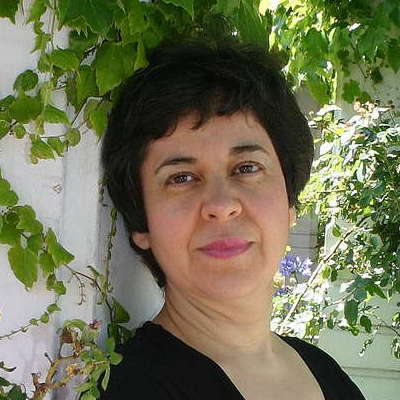 SPONSORED: A Seasoned Champion of New Music. Argentinian-American pianist Mirian Conti in conversation with Andrew Schartmann.
SPONSORED: A Seasoned Champion of New Music. Argentinian-American pianist Mirian Conti in conversation with Andrew Schartmann.
All sponsored features >>
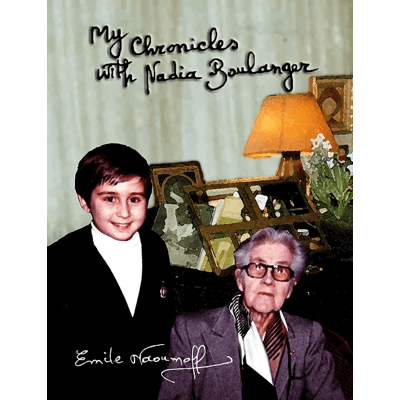 PODCAST: Join Jenna Orkin, Maria Nockin, John Daleiden, Gerald Fenech, Julian Jacobson, Patrick Maxwell, Giuseppe Pennisi and Mike Wheeler for a fascinating fifty-minute audio only programme.
PODCAST: Join Jenna Orkin, Maria Nockin, John Daleiden, Gerald Fenech, Julian Jacobson, Patrick Maxwell, Giuseppe Pennisi and Mike Wheeler for a fascinating fifty-minute audio only programme.
'Boris' at La Scala
GIUSEPPE PENNISI is impressed by the HD transmission from Milan of Modest Musorgsky's opera
On 7 December 2022, Saint Ambrose, Milan's saint protector, La Scala opened the opera season with a new production of Boris by Modest Musorgsky. This was an important opportunity after two years of inaugurations a bit truncated by the pandemic. In the 'royal box' were the President of the Republic, the President of the Council, the President of the European Commission and the President of the Senate with various ministers. In the stalls and in the boxes - at 2,500 euro a ticket - were many authorities and representatives of industry and finance, with thirty-five minutes intermission time to see, be seen and exchange ideas. There was dinner for lucky guests at the Società del Giardino, one of Milan's most elegant clubs, and a buffet on stage for artists, workers and journalists not invited to the Società del Giardino. This year, for health reasons, I could not travel to Milan, but enjoyed the opera in HD.
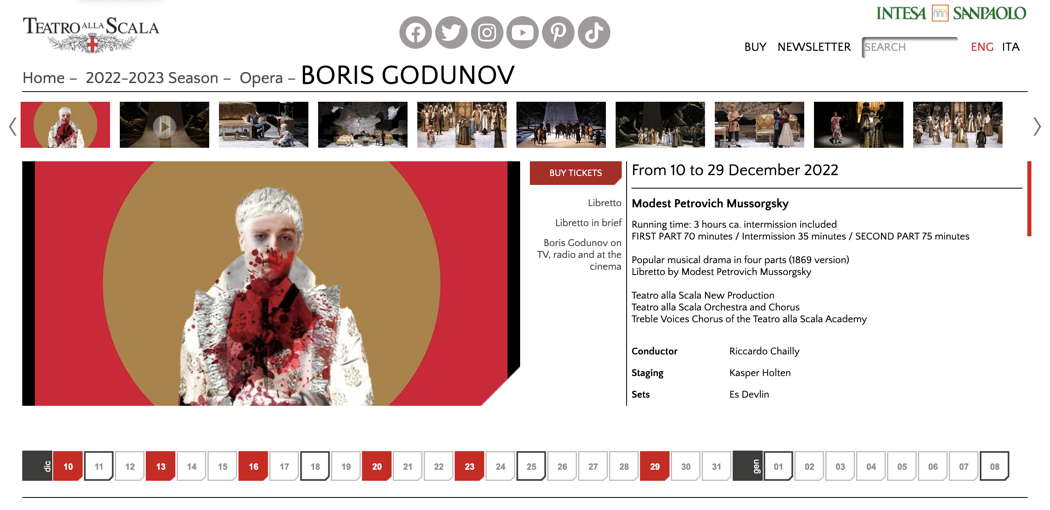
Online publicity for Musorgsky's Boris Godunov at La Scala Milan
The opera is not performed often but it is not rare as sometimes reported. Suffice it to say that only at La Scala, between 1909 and 2002, it appeared in the program of twenty-five seasons – at an average of one Boris every four years - led by illustrious conductors such as Toscanini, Panizza, Guarnieri, Votto, Svetlanov, Gavazzeni, Abbado and Gergiev. As in the case of performances conducted by Gergiev in 2002, the opera is presented on this occasion in the initial version of 1869 in seven scenes and not in the larger and better known version of 1872 in nine scenes. (Three were added and one was suppressed.) The fact that a title focused on Russian political history is staged while the Russian-Ukrainian war is underway is a bitter coincidence, as the opera had been put in the pipeline - like every opera house of international importance, La Scala schedules its seasons well in advance - well before Putin's armies invaded Ukraine. Some Ukrainians protested outside the theater, but the opera shows how, from the sixteenth century to today, in Russia not much has changed in terms of authoritarianism, intrigue, desire for expansion and poverty of the population.
Modest Musorgsky developed at least two versions of the text of Boris. They are based, in part, on the 'romantic tragedy' in twenty-four scenes by Alexander Pushkin (written in 1825, but published, after considerable difficulties with tsarist censorship, in 1831 and staged, however with numerous cuts, only in 1870) and partly on Nikolai Karamazin's History of the Russian State. (Written in 1816-29, this book became an unofficial textbook in Romanov Russia.) Pushkin and Karamazin saw the story of Boris (who came to power at the end of the sixteenth century in an endless land but torn apart by vast deep struggles) with very different glasses. Pushkin looked to Shakespeare, to the tragedy of power built on crime as in Macbeth and Richard III, but then overwhelmed by remorse, as well as by his own deceptions. Karamazin, court historian, must have had, for reasons of office, a very different reading: the tormented story of the usurper tsar was only an episode in the process that would lead to the pacification and unity of 'all the Russias' thanks to the Romanovs.
In summary, Boris stages the attempt to create (also using infanticide) the political unity of Russia. The attempt fails when a young monk (Grigori) revolts against the usurper tsar (Boris Godunov). He proclaims that he himself is the heir to the throne disappeared in mysterious circumstances (Dmitri), uses his attractiveness to conquer the princess at the head of the Polish diet (or be seduced by her) and, with the help of the Jesuits eager to 'Catholicize' Russia, forms an army of insurgents, Poles and even Lithuanians to march against Moscow. In the final version of 1874, the work has an open conclusion: armies follow one another in a forest near the capital to start a war that would probably last thousands of years. The Simpleton (considered a fool by the aristocracies) weeps over the miseries of the country which, he believes, will remain eternal.
The first Boris or 'Ur-Boris' is, instead, focused on the rise and fall of the tsar, who is present in four scenes out of seven. The opera combines the ambition to help create a Russian national music theatre and to replicate Shakespearean tragedies. It was a success with the public. However, it was harshly panned by critics: there were no female characters (and there was, therefore, no love plot), the heroic tenor (Grigori / Dmitri) was on stage only in one scene and there was no ballet. The second Boris, written and composed in 1871-72, is, therefore, no longer focused on the tragedy of the tsar overwhelmed by his own crimes and his unbridled lust for power, but on the whole of Russia and its international context in the 'time of troubles': the protagonist is present in only three scenes out of nine. There is room for a political-love plot between the ambitious Polish princess and the young 'novice' (Grigori / Dmitrij) of the age of Tsarevich Dmitry (killed by Boris to assume the throne) who takes the clothes and the name of his peer and with the help of foreign armies prepares to become, himself, a new usurper. However, numerous cuts were made (such as the 'scene of St Basil' of the boyars' plot against Boris weakened by the advance of the coalition led by the false Dmitri) and there is a short ballet too, to the rhythm of a polonaise.
The orchestration of both the first and the second Boris was judged crude even by the composer's closest friends (such as Rimsky-Korsakov) because Musorgsky (self-taught as forced to earn his bread as an officer, first, and as a bureaucrat, later) would not have sufficiently cared for it. In addition, Musorgsky had the habit of orchestrating the individual scenes of the various versions while maintaining the pen writing of the vocals (and not modifying it as it evolved from version to version). In fact, until relatively recent times, there were editions that did not correspond to either of the two and a half editions edited by Musorgsky himself. Until the end of the sixties, Boris was mainly performed in the 'long' edition orchestrated by Rimsky-Korsakov and more recently the 'long' edition edited by Shostakovich (who also edited a re-orchestration of Ur-Boris, almost never performed, even in Russia itself).
Finally, in 1975, a new critical edition was published in Great Britain by David Lloyd-Jones; it is performed regularly at New York Metropolitan Opera (where it debuted in 1976 and then I saw and listened to it) and elsewhere, and shows the power of the original orchestration; it includes 'the Polish act' and the final scene in the forest. Although David Lloyd-Jones has prepared a critical edition of Ur-Boris, it is rarely performed. In Italy, I saw and heard Lloyd-Jones' critical revision of the nine-scene version in Florence in 2005 and Palermo in 2012. I must say that I much prefer the second version to the Ur-Boris seen and heard in Rome at the inauguration of the Teatro dell'Opera season in 1998. While the first version is – as we have said – focused on the 'crime and punishment' of the protagonist, that of 1871-72 is a choral fresco with a political attitude and a strong scenic impact.
The stage direction of this La Scala Boris is by Kasper Holten, former Director of Covent Garden, of which I remember an excellent and innovative La Traviata in Stockholm about fifteen years ago. In this Scala Boris, Holten takes a look at the history of Russia, combining emotional participation with a reflection on the value of memory and testimony.
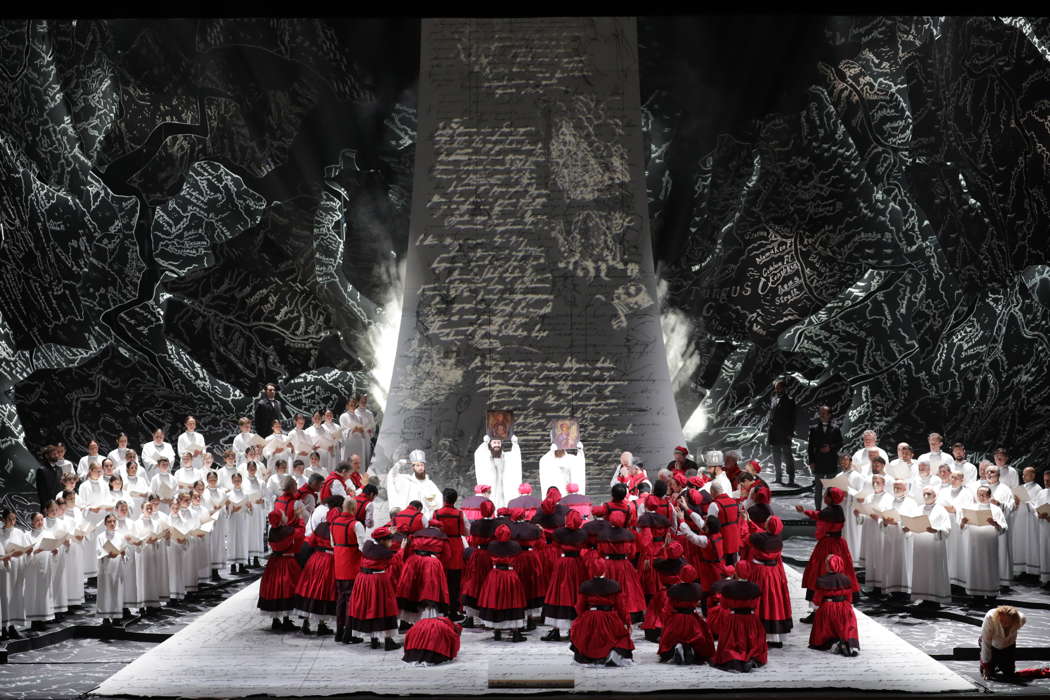
A scene from Part 1 of Musorgsky's Boris at La Scala. Photo © 2022 Brescia e Amisano
In the first part, the scenic action is clearly in the sixteenth century, while in the second, the set is essentially only one and the costumes vary from the beginning of the twentieth century to the present day. You may or may not like that. Another questionable aspect is the presence on stage of the young tsarevich Dmitry, who should be only in Boris's tormented mind. The grand sets are by Es Devlin, the sumptuous costumes by Ida Marie Ellekilde, and there's effective lighting by Jonas Bøg and Luke Halls.
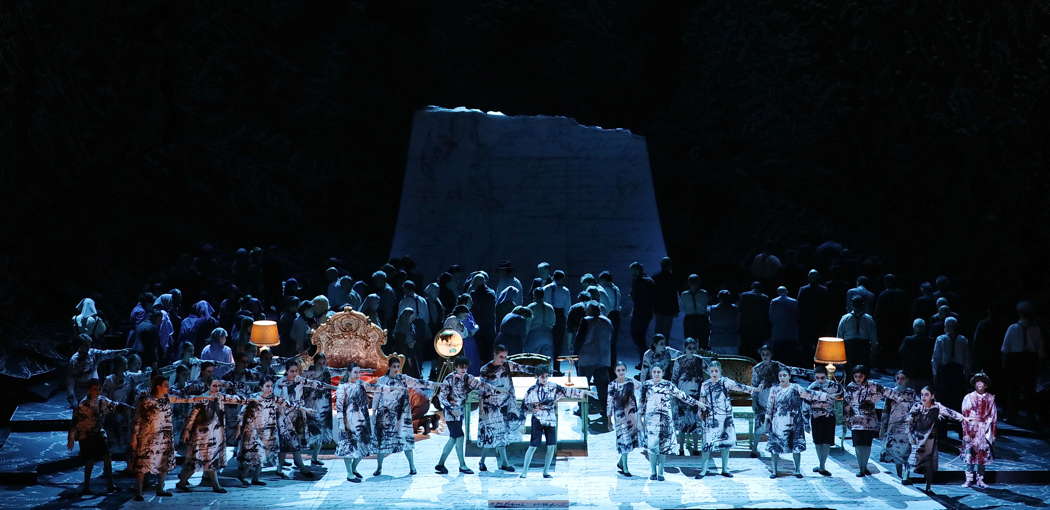
A scene from Part 2 of Musorgsky's Boris at La Scala. Photo © 2022 Brescia e Amisano
The cast includes Norbert Ernst (Vasily Suisky, first accomplice and then traitor of Boris), Alexey Markov (Shchelkalov), Alexander Kravetz (Misail), Stanislav Trofimov (Varlaam) and Maria Barakova (the owner of the tavern). They are not singers of wide notoriety in Italy, but they are very reliable interpreters in the Russian repertoire. The cast revolves around Ildar Abdrazakov, a bass with a strong personality and long experience, whom the La Scala audience remembers as the compelling protagonist of Verdi's Attila that inaugurated the 2018-19 season.
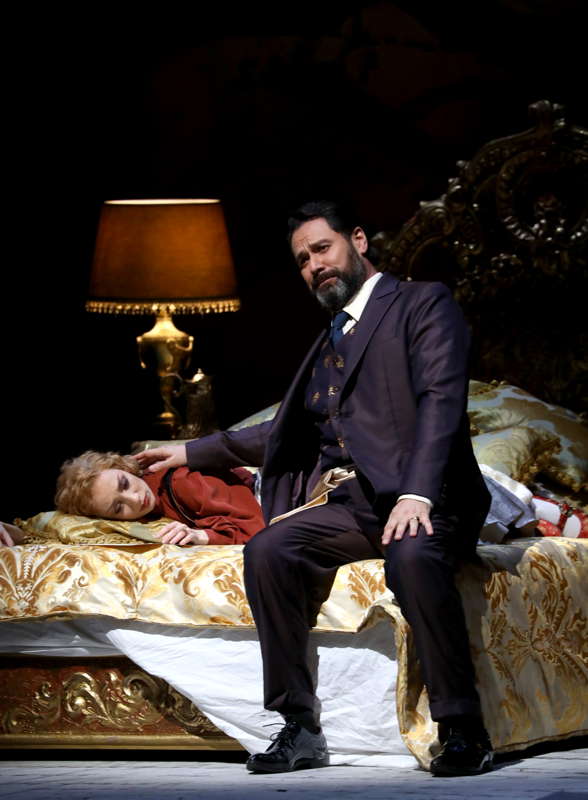
Ildar Abdrazakov as Boris and Anna Denisova as his daughter Ksenja in Musorgsky's Boris at La Scala. Photo © 2022 Brescia e Amisano
A frequent interpreter at New York Metropolitan Opera, at forty-eight he has the perfect age for Boris, in whose role he was appreciated recently in Monte Carlo. The ending, with the death of Boris sung in 'mezza voce', was simply magnificent. Two other interpreters, so far little known in Italy, are of great importance. The first is the Russian tenor Dmitry Golovnin (Grigory) and the second is the Estonian bass Ain Anger, who is entrusted with the beautiful, hieratic part of the narrator-chronicler Pimen. Dmitry Golovnin, in particular, has a center register, timbre and volume reminiscent of Nicolai Gedda.
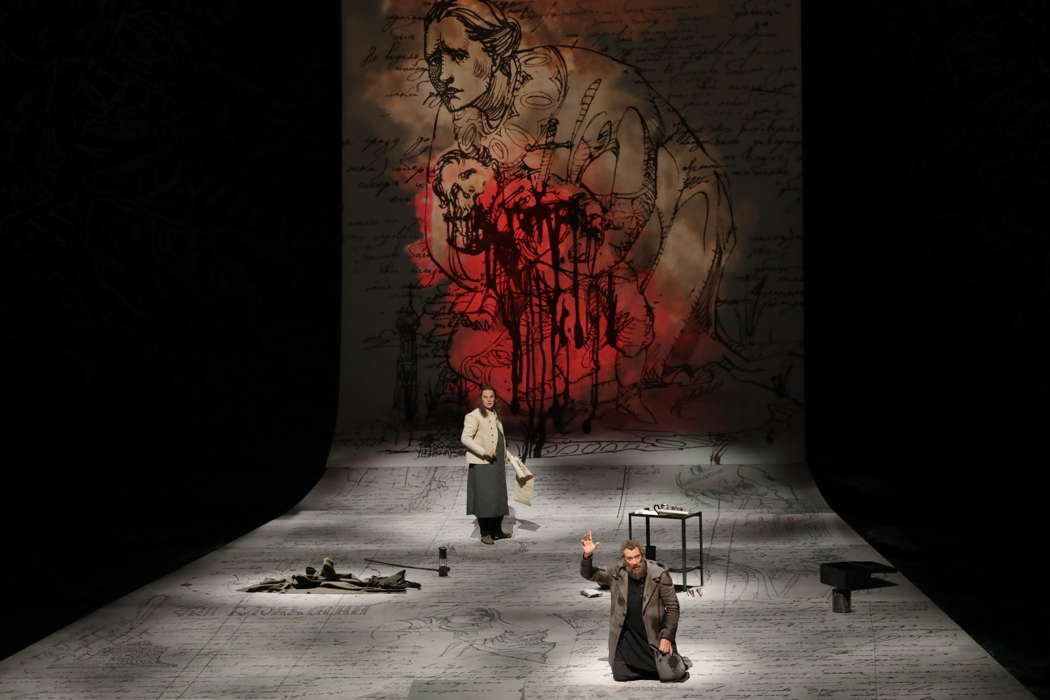
Ain Anger as Pimen and Dmitry Golovnin as Grigory in Musorgsky's Boris at La Scala. Photo © 2022 Brescia e Amisano
The chorus of La Scala, prepared by Alberto Malazzi, was also one the protagonists. The preparation of long pieces in Russian took three months.
Riccardo Chailly's conducting emphasizes the 'modern' aspects of Musorgsky's orchestration, sometimes rough and sometimes strident, always with great care not to 'cover' the voices. Occasionally, I thought he was conducting Berg rather than Musorgsky.
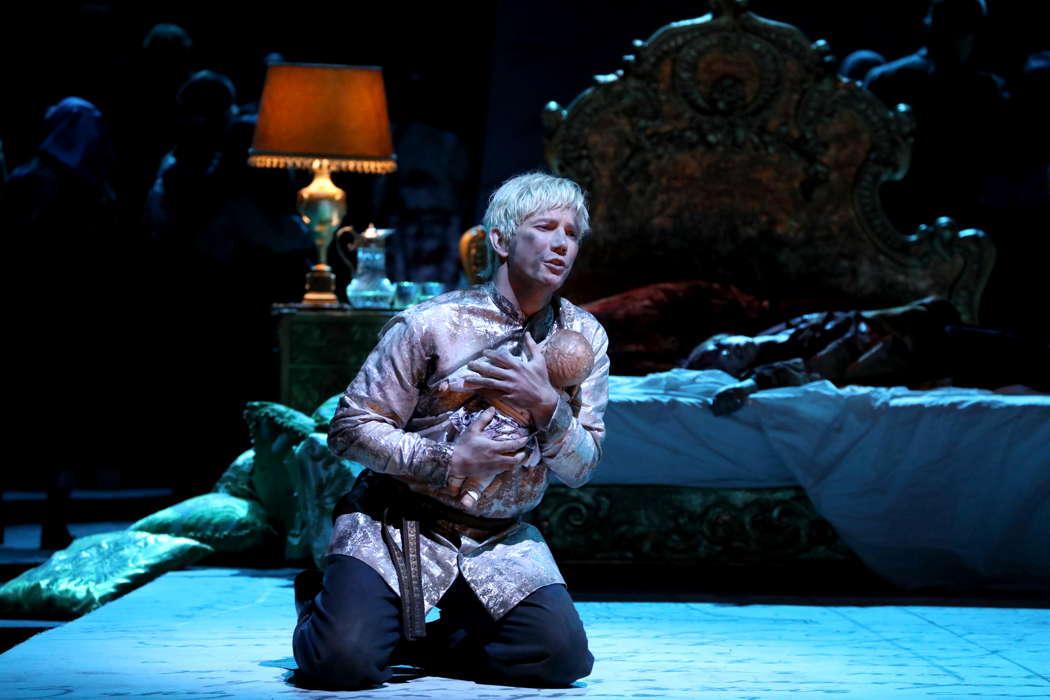
Yaroslav Abaimov as The Fool in Musorgsky's Boris at La Scala. Photo © 2022 Brescia e Amisano
It was a great success, with five minutes of applause after the first part and over a quarter of an hour at the fall of the curtain.
Copyright © 10 December 2022
Giuseppe Pennisi,
Rome, Italy

ARTICLES ABOUT MUSORGSKY'S 'BORIS GODUNOV'


